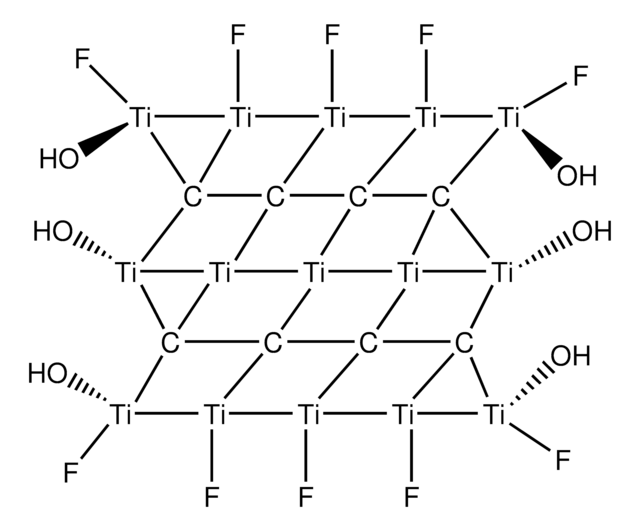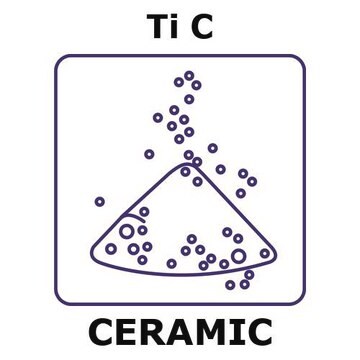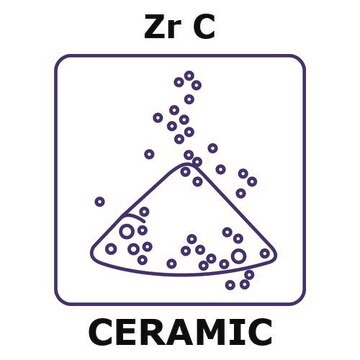636967
Titanium carbide
nanopowder, ≤200 nm particle size (SEM)
Synonym(s):
Titanium(IV) carbide
Sign Into View Organizational & Contract Pricing
All Photos(4)
About This Item
Linear Formula:
TiC
CAS Number:
Molecular Weight:
59.88
EC Number:
MDL number:
UNSPSC Code:
12352302
PubChem Substance ID:
NACRES:
NA.23
Recommended Products
form
nanopowder
particle size
≤200 nm (SEM)
bp
4820 °C (lit.)
mp
3140 °C (lit.)
density
4.930 g/mL at 25 °C (lit.)
bulk density
0.45 g/mL
SMILES string
[C-]#[Ti+]
InChI
1S/C.Ti/q-1;+1
InChI key
YXIVWSJCLXKLJL-UHFFFAOYSA-N
Looking for similar products? Visit Product Comparison Guide
Related Categories
Application
- Conductive two-dimensional titanium carbide ′clay′ with high volumetric capacitance: This study demonstrates the high volumetric capacitance of titanium carbide (Ti3C2) films, which are produced by etching aluminum from titanium aluminum carbide (M Ghidiu et al., 2014).
- Unique lead adsorption behavior of activated hydroxyl group in two-dimensional titanium carbide: The research highlights the lead adsorption capabilities of 2D titanium carbide due to activated hydroxyl groups (Q Peng et al., 2014).
- Transparent, flexible, and conductive 2D titanium carbide (MXene) films with high volumetric capacitance: This article describes the synthesis and properties of transparent and flexible 2D titanium carbide films, which exhibit high volumetric capacitance (C Zhang et al., 2017).
Storage Class
11 - Combustible Solids
wgk_germany
WGK 1
ppe
Eyeshields, Gloves, type N95 (US)
Choose from one of the most recent versions:
Already Own This Product?
Find documentation for the products that you have recently purchased in the Document Library.
Customers Also Viewed
T Henning et al.
Spectrochimica acta. Part A, Molecular and biomolecular spectroscopy, 57(4), 815-824 (2001-05-10)
We review the evidence for carbides in space both from infrared spectroscopy and direct measurements on presolar grains extracted from primitive meteorites. The paper includes a discussion of the structural properties of silicon carbide and metal carbides and their formation
Jorge L Chávez et al.
Nanotechnology, 21(5), 055703-055703 (2009-12-22)
Hybrid organic-inorganic templates and core-shell nanoparticles were used as models to study the communication between fluorescent probes placed inside nanoparticles. The hybrid templates were prepared on the basis of a mixed-surfactant system using octadecyltrimethoxysilane as a reactive amphiphile. The core-shell
Xiaoli Cui et al.
Journal of nanoscience and nanotechnology, 7(9), 3140-3145 (2007-11-21)
In this paper, nanostructured carbon-doped titanium dioxide (TiO(2-x)Cx) has been fabricated from titanium carbide (TiC) thin film using electrochemical anodization in a solution containing fluorine ion. The resulting samples were characterized via scanning electron microscopy (SEM), energy dispersive X-ray (EDX)
K J MacKenzie et al.
Solid state nuclear magnetic resonance, 4(4), 193-201 (1995-05-01)
The first 47,49Ti, 13C, 14N and 15N solid-state nuclear magnetic resonance (NMR) spectra of titanium carbide, nitride and a series of cubic carbonitrides have been obtained under both static and magic-angle spinning (MAS) conditions. The 15N samples were isotopically enriched
Minzhi Wang et al.
Bioelectrochemistry (Amsterdam, Netherlands), 86, 46-53 (2012-02-22)
We report on the direct electrochemistry of myoglobin (Mb) immobilized on a composite matrix based on chitosan (CHIT) and titanium carbide nanoparticles (TiC NPs) underlying on glassy carbon electrode (GCE). The cyclic voltammetry and electrochemical impedance spectroscopy were used to
Articles
Among various ceramics, one-dimensional (1-D) piezoelectric ceramics have attracted significant scientific attention for use in energy harvesting.
Our team of scientists has experience in all areas of research including Life Science, Material Science, Chemical Synthesis, Chromatography, Analytical and many others.
Contact Technical Service













